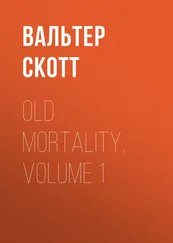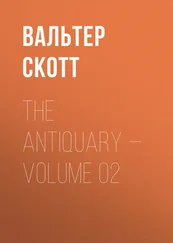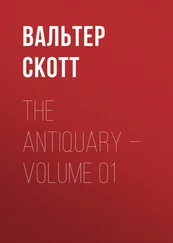Вальтер Скотт - Waverley Novels — Volume 12
Здесь есть возможность читать онлайн «Вальтер Скотт - Waverley Novels — Volume 12» — ознакомительный отрывок электронной книги совершенно бесплатно, а после прочтения отрывка купить полную версию. В некоторых случаях можно слушать аудио, скачать через торрент в формате fb2 и присутствует краткое содержание. Жанр: foreign_antique, foreign_prose, Альтернативная история, на английском языке. Описание произведения, (предисловие) а так же отзывы посетителей доступны на портале библиотеки ЛибКат.
- Название:Waverley Novels — Volume 12
- Автор:
- Жанр:
- Год:неизвестен
- ISBN:нет данных
- Рейтинг книги:5 / 5. Голосов: 1
-
Избранное:Добавить в избранное
- Отзывы:
-
Ваша оценка:
- 100
- 1
- 2
- 3
- 4
- 5
Waverley Novels — Volume 12: краткое содержание, описание и аннотация
Предлагаем к чтению аннотацию, описание, краткое содержание или предисловие (зависит от того, что написал сам автор книги «Waverley Novels — Volume 12»). Если вы не нашли необходимую информацию о книге — напишите в комментариях, мы постараемся отыскать её.
Waverley Novels — Volume 12 — читать онлайн ознакомительный отрывок
Ниже представлен текст книги, разбитый по страницам. Система сохранения места последней прочитанной страницы, позволяет с удобством читать онлайн бесплатно книгу «Waverley Novels — Volume 12», без необходимости каждый раз заново искать на чём Вы остановились. Поставьте закладку, и сможете в любой момент перейти на страницу, на которой закончили чтение.
Интервал:
Закладка:
It is affecting to see the great Miguel Cervantes himself, even like the sons of meaner men, defending himself against the critics of the day, who assailed him upon such little discrepancies and inaccuracies as are apt to cloud the progress even of a mind like his, when the evening is closing around it. "It is quite a common thing," says Don Quixote, "for men who have gained a very great reputation by their writings before they were printed, quite to lose it afterwards, or, at least, the greater part." — "The reason is plain," answers the Bachelor Carrasco; "their faults are more easily discovered after the books are printed, as being then more read, and more narrowly examined, especially if the author has been much cried up before, for then the severity of the scrutiny is sure to be the greater. Those who have raised themselves a name by their own ingenuity, great poets and celebrated historians, are commonly, if not always, envied by a set of men who delight in censuring the writings of others, though they could never produce any of their own." — "That is no wonder," quoth Don Quixote; "there are many divines that would make but very dull preachers, and yet are quick enough at finding faults and superfluities in other men's sermons." — "All this is true," says Carrasco, "and therefore I could wish such censurers would be more merciful and less scrupulous, and not dwell ungenerously upon small spots that are in a manner but so many atoms on the face of the clear sun they murmur at. If aliquando dormitat Homerus , let them consider how many nights he kept himself awake to bring his noble works to light as little darkened with defects as might be. But, indeed, it may many times happen, that what is censured for a fault, is rather an ornament, as moles often add to the beauty of a face. When all is said, he that publishes a book, runs a great risk, since nothing can be so unlikely as that he should have composed one capable of securing the approbation of every reader." — "Sure," says Don Quixote, "that which treats of me can have pleased but few?" — "Quite the contrary," says Carrasco; "for as infinitus est numerus stultorum , so an infinite number have admired your history. Only some there are who have taxed the author with want of memory or sincerity, because he forgot to give an account who it was that stole Sancho's Dapple, for that particular is not mentioned there, only we find, by the story, that it was stolen; and yet, by and by, we find him riding the same ass again, without any previous light given us into the matter. Then they say that the author forgot to tell the reader what Sancho did with the hundred pieces of gold he found in the portmanteau in the Sierra Morena, for there is not a word said of them more; and many people have a great mind to know what he did with them, and how he spent them; which is one of the most material points in which the work is defective."
How amusingly Sancho is made to clear up the obscurities thus alluded to by the Bachelor Carrasco — no reader can have forgotten; but there remained enough of similar lacunas , inadvertencies, and mistakes, to exercise the ingenuity of those Spanish critics, who were too wise in their own conceit to profit by the good-natured and modest apology of this immortal author.
There can be no doubt, that if Cervantes had deigned to use it, he might have pleaded also the apology of indifferent health, under which he certainly laboured while finishing the second part of "Don Quixote." It must be too obvious that the intervals of such a malady as then affected Cervantes, could not be the most favourable in the world for revising lighter compositions, and correcting, at least, those grosser errors and imperfections which each author should, if it were but for shame's sake, remove from his work, before bringing it forth into the broad light of day, where they will never fail to be distinctly seen, nor lack ingenious persons, who will be too happy in discharging the office of pointing them out.
It is more than time to explain with what purpose we have called thus fully to memory the many venial errors of the inimitable Cervantes, and those passages in which he has rather defied his adversaries than pleaded his own justification; for I suppose it will be readily granted, that the difference is too wide betwixt that great wit of Spain and ourselves, to permit us to use a buckler which was rendered sufficiently formidable only by the strenuous hand in which it was placed.
The history of my first publications is sufficiently well known. Nor did I relinquish the purpose of concluding these "Tales of my Landlord," which had been so remarkably fortunate; but Death, which steals upon us all with an inaudible foot, cut short the ingenious young man to whose memory I composed that inscription, and erected, at my own charge, that monument which protects his remains, by the side of the river Gander, which he has contributed so much to render immortal, and in a place of his own selection, not very distant from the school under my care. [Footnote: See Vol. II. of the present Edition, for some circumstances attending this erection.] In a word, the ingenious Mr. Pattison was removed from his place.
Nor did I confine my care to his posthumous fame alone, but carefully inventoried and preserved the effects which he left behind him, namely, the contents of his small wardrobe, and a number of printed books of somewhat more consequence, together with certain, wofully blurred manuscripts, discovered in his repository. On looking these over, I found them to contain two Tales called "Count Robert of Paris," and "Castle Dangerous;" but was seriously disappointed to perceive that they were by no means in that state of correctness, which would induce an experienced person to pronounce any writing, in the technical language of bookcraft, "prepared for press." There were not only hiatus valde deflendi , but even grievous inconsistencies, and other mistakes, which the penman's leisurely revision, had he been spared to bestow it, would doubtless have cleared away. After a considerate perusal, I no question flattered myself that these manuscripts, with all their faults, contained here and there passages, which seemed plainly to intimate that severe indisposition had been unable to extinguish altogether the brilliancy of that fancy which the world had been pleased to acknowledge in the creations of Old Mortality, the Bride of Lammermoor, and others of these narratives. But I, nevertheless, threw the manuscripts into my drawer, resolving not to think of committing them to the Ballantynian ordeal, until I could either obtain the assistance of some capable person to supply deficiencies, and correct errors, so as they might face the public with credit, or perhaps numerous and more serious avocations might permit me to dedicate my own time and labour to that task.
While I was in this uncertainty, I had a visit from a stranger, who was announced as a young gentleman desirous of speaking with me on particular business. I immediately augured the accession of a new boarder, but was at once checked by observing that the outward man of the stranger was, in a most remarkable degree, what mine host of the Sir William Wallace, in his phraseology, calls seedy . His black cloak had seen service; the waistcoat of grey plaid bore yet stronger marks of having encountered more than one campaign; his third piece of dress was an absolute veteran compared to the others; his shoes were so loaded with mud as showed his journey must have been pedestrian; and a grey maud , which fluttered around his wasted limbs, completed such an equipment as, since Juvenal's days, has been the livery of the poor scholar. I therefore concluded that I beheld a candidate for the vacant office of usher, and prepared to listen to his proposals with the dignity becoming my station; but what was my surprise when I found I had before me, in this rusty student, no less a man than Paul, the brother of Peter Pattison, come to gather in his brother's succession, and possessed, it seemed, with no small idea of the value of that part of it which consisted in the productions of his pen!
Читать дальшеИнтервал:
Закладка:
Похожие книги на «Waverley Novels — Volume 12»
Представляем Вашему вниманию похожие книги на «Waverley Novels — Volume 12» списком для выбора. Мы отобрали схожую по названию и смыслу литературу в надежде предоставить читателям больше вариантов отыскать новые, интересные, ещё непрочитанные произведения.
Обсуждение, отзывы о книге «Waverley Novels — Volume 12» и просто собственные мнения читателей. Оставьте ваши комментарии, напишите, что Вы думаете о произведении, его смысле или главных героях. Укажите что конкретно понравилось, а что нет, и почему Вы так считаете.












